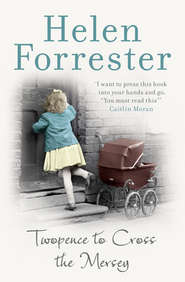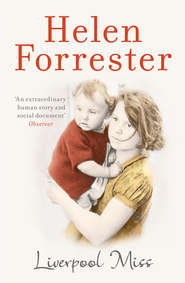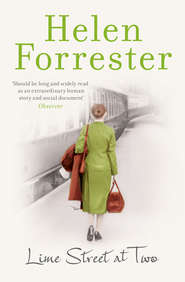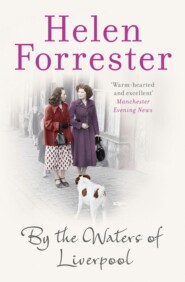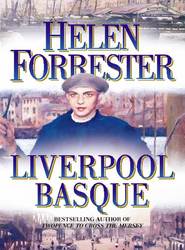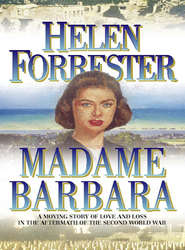По всем вопросам обращайтесь на: info@litportal.ru
(©) 2003-2024.
✖
The Complete Helen Forrester 4-Book Memoir: Twopence to Cross the Mersey, Liverpool Miss, By the Waters of Liverpool, Lime Street at Two
Настройки чтения
Размер шрифта
Высота строк
Поля
Miss Sinford pointed an accusing finger at a cardboard box and a wet battery beside it. The box was clearly marked that it contained a radio, and I guessed that it had been delivered in connection with Mother’s new job.
‘Thank you, Miss Sinford.’
I sat Edward down on the grubby hall runner, and Miss Sinford withdrew with one of her loudest sniffs of disapproval. Avril had followed me down, and I left her to mind Edward while I puffed my way upstairs again with the radio. I made a second journey for the wet battery and carried it up so fast that I splashed some of the acid on my bare legs, burning them painfully.
A third journey was made to retrieve Edward and Avril.
Still panting from the journeys up and down, I read the instructions on the outside of the box to Avril, and then very carefully unpacked the radio and put it on the table. I plugged in the wet and dry batteries and nervously turned one of the knobs. The shining newness of it awed us both.
Suddenly the room was filled with the sweet sound of violins.
Avril climbed up on to one of the chairs and put her head close to the speaker and Edward smiled and sucked his thumb. I stood in ecstasy while the music swept round me.
We spent a blissful afternoon listening to a faraway world where people spoke as we did and music was part of life.
My parents were extremely angry when they came home and found the radio unpacked and working.
‘It does not belong to us,’ said my mother furiously. ‘You know quite well that you are not to touch anything which does not belong to you.’
‘I haven’t harmed it,’ I said defiantly.
‘No, she has not,’ interrupted Avril aggressively. ‘And I heard a nice lady say “happy birthday” and “hello, twins” on Children’s Hour and I liked it.’
‘Well,’ said Father, turning it off firmly. ‘Don’t touch it again.’
Mother said, ‘I have to demonstrate it tonight, to Mr and Mrs Smithers, and I don’t know how to do it.’
‘You just put these plugs in here, like Helen did, and you turn that knob there,’ instructed Avril, stabbing the appropriate plugs and knob with a grubby finger. ‘And it goes.’
She looked up at my mother with hard blue eyes, as if daring her to say she was not right.
Father smiled.
‘She is right, you know. That is all you have to do.’ He looked worried. ‘I suppose the supervisor will move the thing to the Smithers’ house for you in his car?’
‘Heavens, no. I have to take it myself.’
‘But you can’t carry that weight,’ we said in chorus.
‘Besides,’ I added, sadly surveying the burning marks on my grey legs, ‘the acid from the wet battery can splash and burn your stockings.’
We all knew that without stockings Mother was not suitably dressed for work, and we had all observed that even if she was not much interested in us, she was more alive, more aware of things going on around her, when looking for work.
Silence fell upon the family. The radio and its batteries were really too awkward for anyone to carry any distance.
Tony, who had been playing one of his endless games of puffer-trains with a dead cinder from the fireplace, looked up, as he shunted his imaginary train into an imaginary siding, and said quietly, ‘Put it in the Chariot and wheel it round to the lady’s house.’
We all burst out laughing, and I snatched Edward out of the pram.
‘Try it for size,’ I invited.
Very carefully, the radio was put back into its box and lowered into the stinking pram. The batteries followed. It all fitted in.
A gentle sigh of relief went through the family.
We ate a hasty meal of boiled potatoes, which tasted strongly of the smoke from an old shoe I had picked up in the street and brought home for fuel. Then, since it was dark, the whole family went in procession behind Father, who carefully wheeled the Chariot with its unusual contents. I clutched Edward to me and brought up the rear.
Down the street under the light of the gas-lamps we marched, past the brothels, past the garish lights and conversational roar of the local pub, past the boys lounging at the street corners, who watched the weird procession speculatively, out of the slum which was our world, into quieter streets of neat terrace housing.
At a corner, out of sight of the home of Mother’s customer, we unloaded the radio and set it down on the pavement. We whispered conspiratorially together, trying to decide how to get it to the house concerned, without the customer seeing any of us except Mother.
Father finally decided that he would make the first sortie and carry the batteries to the front step of the customer’s house which led straight on to the pavement; there was no front yard or garden to be negotiated.
We watched with excited anticipation as he glided ghostlike down the empty street, quickly deposited the batteries, and continued on down the street, round the block and back to us, so that he actually passed the house only once. Then Alan and Mother together carried the radio itself to the house, and put it down on the step. Mother stood by it, while Alan fled down the street, taking the same course as Father had.
Mother was out of sight of all of us, but we heard the peal of the old-fashioned front door bell when she rang it; and the sounds of the door opening and shutting and of strong Lancashire voices came to us clearly through the frosty air.
Brian and Tony started an excited conversation. Father hushed them immediately. He was standing tense, listening like a hound.
My arms were aching with Edward’s weight, so I put him into the pram. Avril complained that she was cold and I put her in with him and rubbed her legs which were mottled like an old woman’s from exposure.
Coatless, hatless and hungry, we were all shivering by the time we heard the sound of the door opening again and cheerful voices bidding Mother ‘good night’.
She was coming slowly towards us. In the gaslight, her face had a look of stupefied wonderment, as if she had just experienced a religious revelation of some kind.
The policeman on the beat was coming slowly towards us, trying the doors of each shop which faced the road on which we stood; and Father, ever fearful of being arrested for vagrancy, moved us slowly to meet Mother.
‘I sold it – that very one – they wanted the demonstration model. They signed the hire purchase agreement and gave me the deposit there and then. And they gave me tea and cake.’ Her voice quivered, as she mentioned the last item.
‘Really?’ exclaimed Father, unable to believe that in Depression-bound Liverpool anybody could afford to buy anything. ‘Are you sure?’
‘Yes,’ she whispered, sudden pride in her voice.
‘What will you get for it? Your commission?’
‘Thirty shillings.’
‘We shall have to tell the public assistance committee. The little bit you earned selling treacle was not worth worrying about We shall have to declare thirty shillings – and they will just cut it off our allowance.’ Father’s voice was tired and old.
‘Are you mad?’ cried Mother with an unexpected burst of spirit.
‘No, of course not. But it is not honest not to tell them.’
‘We will not tell them,’ said Mother savagely. ‘They’d let us die. They don’t care. Why should we bother about what is honest and what is not?’ The bitter question sounded all the more so because it was expressed in her beautiful contralto voice, a voice almost identical to Brian’s.
Father had his arms crossed over his chest and his hands tucked into his armpits to keep them warm. He said in a broken voice, ‘I must have some gloves. I can’t bear the pain in my hands any more.’
‘And I must have lots of fish and chips,’ shouted Avril unexpectedly. ‘Lots of lovely fish and chips.’






